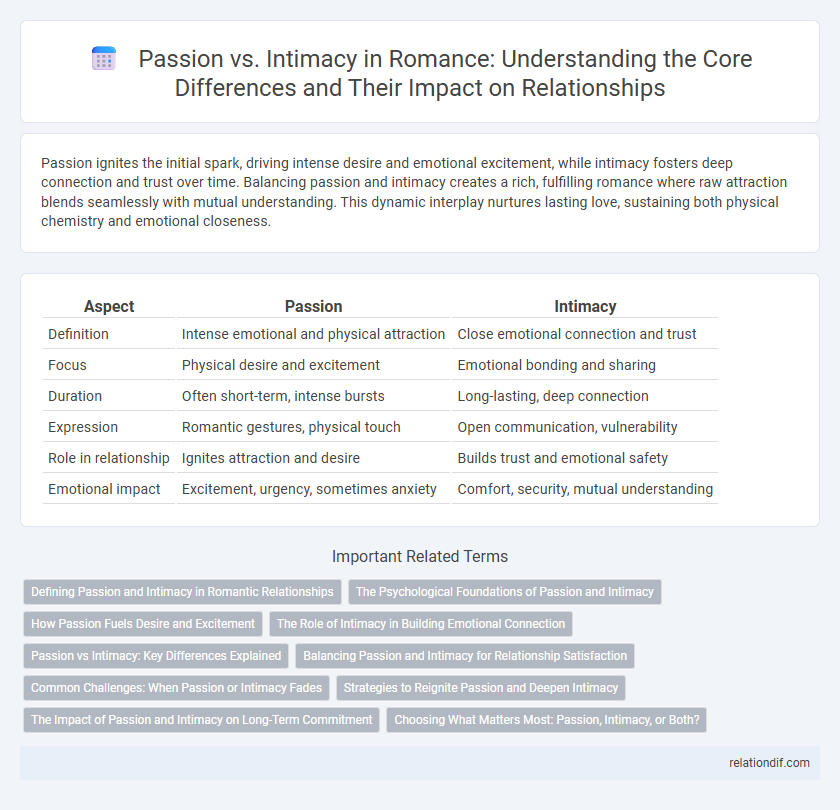Passion ignites the initial spark, driving intense desire and emotional excitement, while intimacy fosters deep connection and trust over time. Balancing passion and intimacy creates a rich, fulfilling romance where raw attraction blends seamlessly with mutual understanding. This dynamic interplay nurtures lasting love, sustaining both physical chemistry and emotional closeness.
Table of Comparison
| Aspect | Passion | Intimacy |
|---|---|---|
| Definition | Intense emotional and physical attraction | Close emotional connection and trust |
| Focus | Physical desire and excitement | Emotional bonding and sharing |
| Duration | Often short-term, intense bursts | Long-lasting, deep connection |
| Expression | Romantic gestures, physical touch | Open communication, vulnerability |
| Role in relationship | Ignites attraction and desire | Builds trust and emotional safety |
| Emotional impact | Excitement, urgency, sometimes anxiety | Comfort, security, mutual understanding |
Defining Passion and Intimacy in Romantic Relationships
Passion in romantic relationships is characterized by intense emotions, physical attraction, and a strong desire for closeness, often sparking excitement and longing. Intimacy involves deep emotional connection, trust, and vulnerability, fostering a sense of security and mutual understanding between partners. Both passion and intimacy are essential components that contribute to a balanced and fulfilling romantic bond, with passion igniting desire and intimacy sustaining long-term commitment.
The Psychological Foundations of Passion and Intimacy
Passion originates from intense emotional arousal and desire, triggering the brain's reward system through dopamine release, which fuels attraction and excitement in romantic relationships. Intimacy stems from psychological safety, trust, and mutual vulnerability, promoting oxytocin secretion that enhances bonding and emotional closeness between partners. Understanding these distinct neurochemical pathways clarifies how passion and intimacy create a balanced, fulfilling romantic connection.
How Passion Fuels Desire and Excitement
Passion ignites intense desire and fuels excitement by triggering powerful emotional and physical responses that heighten attraction. This fiery energy creates a magnetic pull, intensifying romantic connection and sustaining vitality in relationships. Unlike intimacy, which nurtures closeness and trust, passion drives the exhilarating pursuit of romance and spontaneous moments of enchantment.
The Role of Intimacy in Building Emotional Connection
Intimacy plays a crucial role in building a deep emotional connection by fostering trust, vulnerability, and genuine understanding between partners. It creates a safe space where individuals can share their true thoughts and feelings, strengthening the bond beyond physical attraction. Unlike passion, which often ignites quickly and fluctuates, intimacy develops gradually and sustains lasting relational satisfaction.
Passion vs Intimacy: Key Differences Explained
Passion ignites intense emotions and physical attraction often marked by desire and excitement, while intimacy fosters deep emotional connection, trust, and vulnerability between partners. Passion can be fleeting and spontaneous, driving romantic experiences, whereas intimacy develops gradually, creating long-lasting bonds through shared understanding and communication. Balancing passion and intimacy is essential for a healthy romantic relationship, as both elements contribute uniquely to love's fullness and depth.
Balancing Passion and Intimacy for Relationship Satisfaction
Balancing passion and intimacy is vital for sustaining long-term relationship satisfaction, as passion ignites desire while intimacy fosters deep emotional connection. Research from the Kinsey Institute highlights that couples who maintain both elements report higher levels of happiness and commitment. Prioritizing open communication and shared experiences helps partners nurture both passion and intimacy, creating a harmonious and fulfilling romantic bond.
Common Challenges: When Passion or Intimacy Fades
Passion often ignites in the early stages of romance, but its intensity can wane, leading to feelings of disconnection and unfulfilled desire. Intimacy, which fosters emotional closeness and trust, may diminish due to stress, miscommunication, or unresolved conflicts, creating a barrier to deeper connection. Couples facing these challenges benefit from open dialogue and shared experiences to rekindle both passion and intimacy, strengthening their romantic bond over time.
Strategies to Reignite Passion and Deepen Intimacy
Exploring strategies to reignite passion and deepen intimacy involves prioritizing open communication, vulnerability, and shared experiences that foster emotional connection. Incorporating activities like date nights, physical touch, and expressing appreciation regularly enhances both desire and closeness. Mindfulness practices and mutual goal setting support sustained passion and create a solid foundation for intimate bonds.
The Impact of Passion and Intimacy on Long-Term Commitment
Passion ignites intense emotions and physical attraction, creating an initial excitement that draws partners together in romantic relationships. Intimacy fosters deep emotional connection, trust, and understanding, which are essential for sustaining long-term commitment and relationship satisfaction. Balancing passion and intimacy leads to stronger bonds, increased relationship durability, and a more fulfilling partnership over time.
Choosing What Matters Most: Passion, Intimacy, or Both?
Choosing what matters most in romance involves balancing the fiery intensity of passion with the deep connection of intimacy. Passion fuels excitement and physical desire, while intimacy fosters trust, emotional closeness, and long-term bonding. Prioritizing both can create a fulfilling relationship that combines raw attraction with meaningful companionship.
passion vs intimacy Infographic

 relationdif.com
relationdif.com